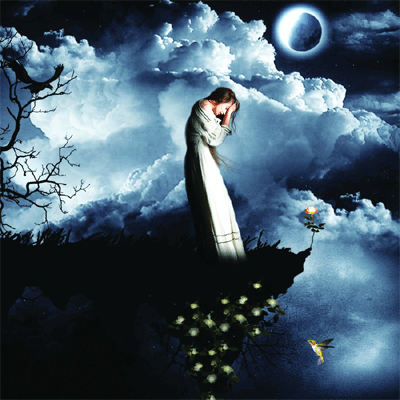kadambari kaul on importance of karma in attainment of higher spiritual states and final liberation
There comes a time in life when overwhelmed by circumstances beyond our control, we turn our minds away from this external world of sensual pleasures and seek happiness within. This happens when suffering visits us in various forms. It could be the untimely death of a loved one, betrayal by an old and trusted friend, a sudden unexpected illness or even a bitter disappointment in life.
It is at such crucial moments in life, when all that we loved and cherished lies shattered before our eyes, that we realise how ephemeral all things of this world are. And then we seek the intransient amidst this transient world, that which will never perish nor pass away, bringing us abiding peace and happiness in this life and after. World-weary and disenchanted, we turn towards the ancient wisdom of the scriptures for comfort and guidance along the journey of life.
And as we quietly reflect and contemplate the eternal truths revealed in the scriptures, there opens before us a more beautiful and purer dimension of reality, as we gradually find answers to eternal questions related to the ultimate issues of life and death and the truth of existence, thereby alleviating our suffering.
The law of karma that operates on the principle ‘as you sow, so shall you reap’ holds out the hope of happiness amidst all the sorrow and suffering in this world, for all good deeds done according to the injunctions in the scriptures. Indeed, karma conditioned by desire determines our present and future state of existence.
Thus, it is desire and attachment to objects of this transient world, caused and conditioned by ignorance about the true nature of reality that leads to karma or action for the attainment of those objects of desire, subjecting the individual to continual rebirth in this relative world. The idea of karma intertwined with rebirth introduced in a concrete form in the Brihadaaranyaka Upanishad is explained by Yajnavalkya to Artabhaga in the Muni or Yajnavalkya Kanda of this ancient and influential Upanishad.
According to Yajnavalkya, the foremost sage of the Upanishads, karma conditioned by desire is the stimulating cause for rebirth in this world of transmigration. He is questioned by Artabhaga in the Brihadaaranyaka Upanishad, as to what remains of the unreleased soul when at death and cremation the various bodily parts go back to their sources or presiding deities, such as the eye goes back to its source the sun, speech to fire, nose to wind, so on and so forth. Yajnavalkya then takes Artabhaga by the hand and in a secluded place away from the crowd reveals to him that what remains of the unreleased soul after the dismantling of the physical body at death and cremation is his karma. One becomes good through good karma and bad through bad karma.
It is karma that produces subtle mental impressions or samskaras stored in the subtle body that transmigrates from one life to another in this relative world. It is only when these samskaras are purified over several rebirths through moral uprightness and contemplation that emancipation from the cycle of rebirth is finally won, upon the realisation of the identity of the individual self or atman with brahman, the supreme self of this universe.
Indeed, the realisation of one’s self or atman as brahman that verily is the all and the non-dual one is to know all there is to know. It is the attainment of the highest knowledge that verily is liberation, the unconditioned bliss of immortal life.
Indeed, it is moral uprightness, self-renunciation and meditation as we walk the path of knowledge, that purges the mind of various defilements such as egotism, envy, hatred and greed, leading to a happier and more peaceful state of existence. Realising the impermanence of all forms of worldly existence, we gradually begin to cultivate an attitude of detachment to all objects of desire that is conducive to higher spiritual attainments and lasting joy.
Gradually, all the allurements of this world of sensual pleasures so fraught with danger begin to lose their hold over the discerning truth-seeker who through renunciation and meditation builds an island of peace and tranquility amidst this ocean of sorrow and suffering. He learns not to regret the past nor to fret about the future, but to live in the present, in the ‘here and now’, as he continues to strive towards higher spiritual attainments. And while looking back, he views the turning point in his life, his moment of sorrow and suffering as a moment of grace, that has led him to the path of truth and knowledge, of abiding peace and tranquility.
Excerpt from Brihadaaranyaka Upanishad:
“Yajnavalkya, asked Artabhaga: when speech of this man who has died (before realising his true, supreme self as the immortal brahman) merges into its source fire; his nose into its source, the air; the eye into its source, the sun; the mind into its source, the moon...”
(Thus, when all these constituents of the dead man have been dismantled, going back to their sources,) Where then that person remainsIJ “Give me your hand wise Artabhaga,” said Yajnavalkya. “Only the two of us should ponder and decide this (profound) matter. It cannot be discussed and resolved in a crowded place such as this.”
So they went out (to a secluded place) and discussed (what remains of a dead man, who dies without realising his true self), and what they discussed was karma (work). (As his support after death, and the stimulating cause of rebirth). What they praised was karma (that survives the death of the unreleased individual). So that one becomes good by good karma and evil by bad (sinful) karma (Good work leading to a covetable rebirth and bad work, to a miserable one.) Thereupon, Artabhaga of the line of Jaratkaru line became silent.
Brihadaaranyaka: The Great Upanishad hasbeen published by leadstart Publishing, written by Kadambari Kaul, Rs300
























